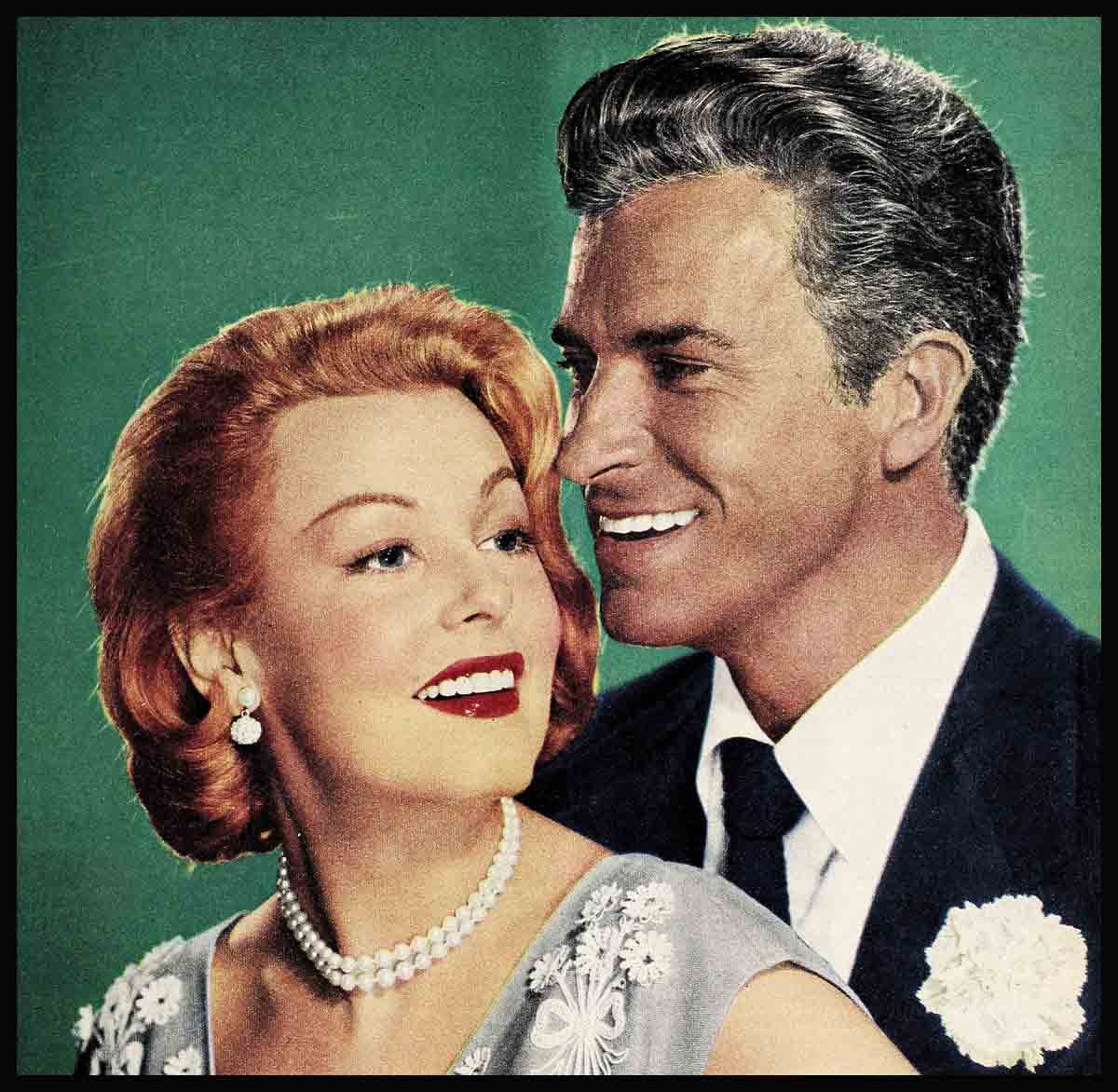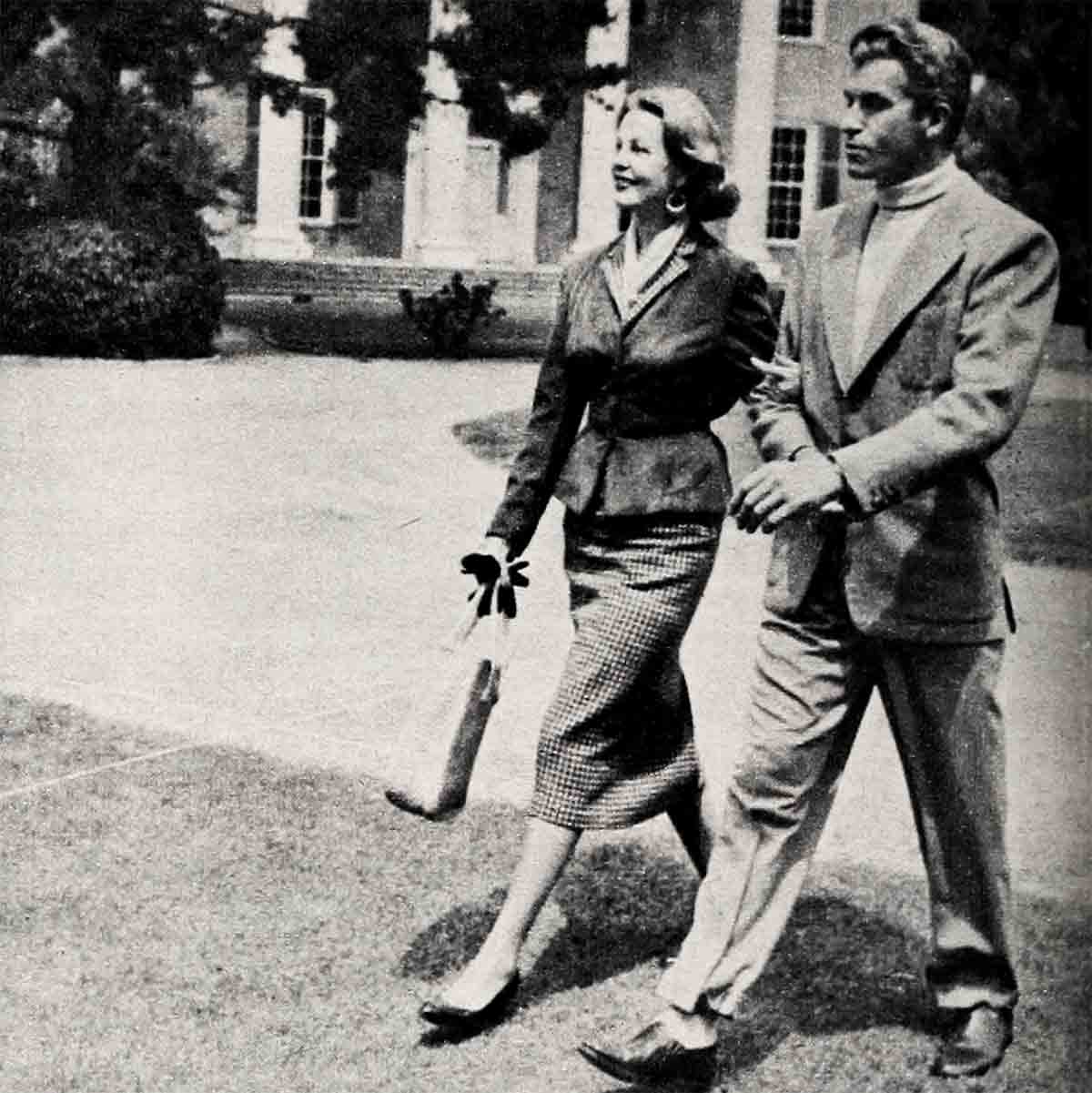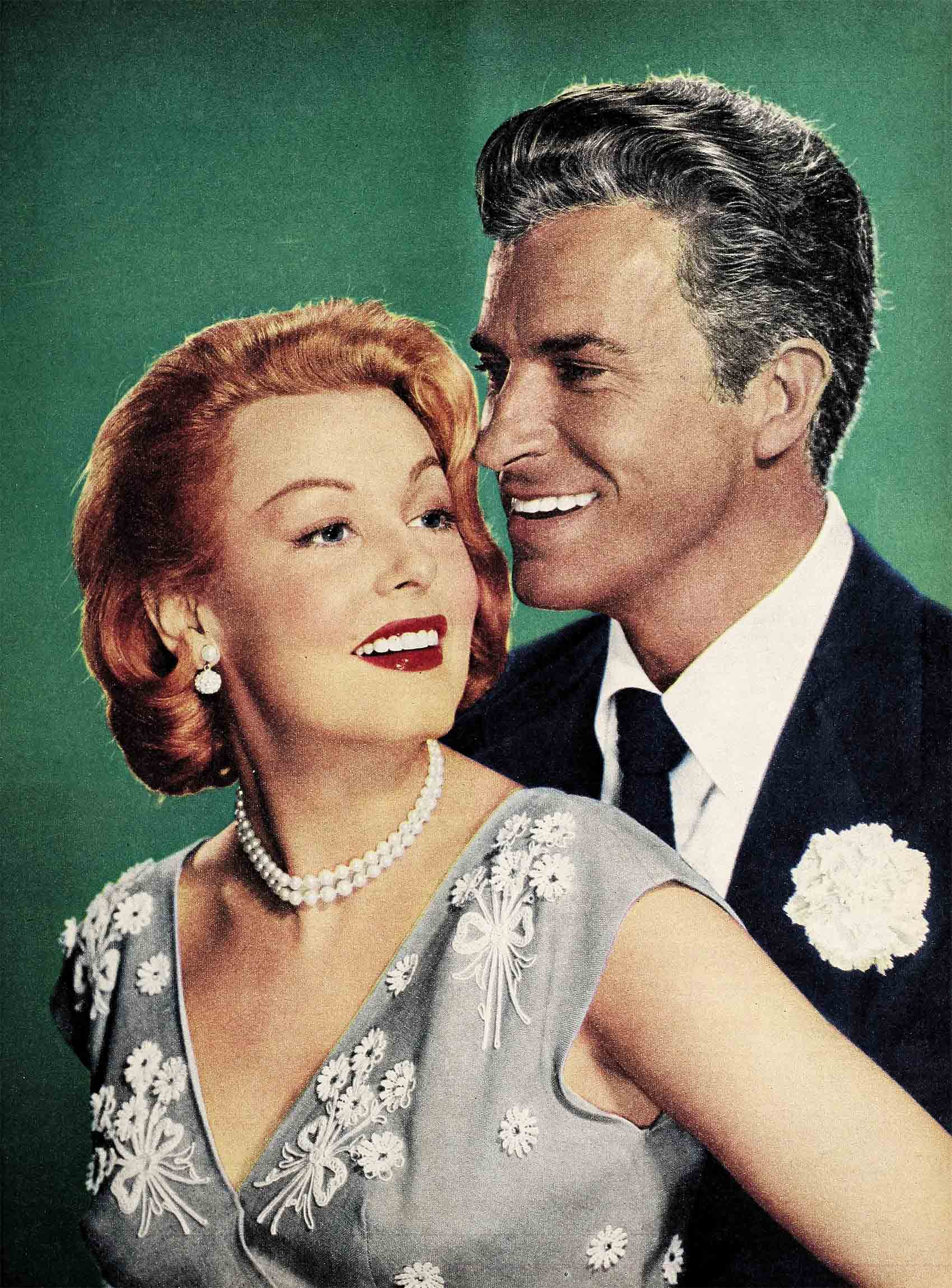
Who Wears The Pants?—Fernando Lamas & Arlene Dahl
There’s an old American tourist joke that goes something like this: An American businessman while visiting Mexico with his wife noticed that the Mexican peons always rode on burros while their wives trudged along behind them. Finally, the couple could control their curiosity no longer, and the man went up to the next peasant on a burro and asked, “Why do you ride when your wife has to walk behind you?” The Mexican, looking very surprised, replied, “But, Senor, my wife, she doesn’t own a burro.”
Because I’m Spanish, many people have asked me since I married Arlene, who rides the burro—in other words, who’s the boss in our family. This is a question, Senoritas, that cannot be answered by a simple “she” or “me.”
I was born in the Argentine of Spanish parents who passed away before I was four. I was brought up by two grandmothers of seventy and I lived for some years in Spain. Naturally, I accepted, as with the air I breathed, the typically Victorian old world concept of the husband as master. His role is the breadwinner and the dominant head of the family; his function, to support and protect his wife, make all major decisions and apportion the family money. His wife’s sphere of influence was strictly the home. I was wary of the self-sufficient, aggressive woman who goes around with a chip on her shoulder because she considers this a man’s world. My preference was for the clinging-vine type.
Now Arlene was born in Minneapolis; her parents came from Norway and had already changed their feelings about family life. While Arlene’s father had been the head of his household, her mother had active interests that took her outside the home—like her painting and welfare-club work. She was certainly not submissive to her husband, although she did permit him to make the family decisions. Theirs was a very happy marriage until her death some years ago. At seventeen, Arlene left home and adopted completely the American attitude: equality for both sexes. She felt very strongly that marriage is a 50-50 proposition and believed in equal sharing of decisions, home responsibilities and financial matters. and maintained that a wife could share both career and home successfully.

When I first met Arlene, she was with M-G-M and she helped me make a screen test there. I did not see her again until two years later, in October 1952. When I did, I fell deeply in love with her. At the time, neither of us paused to consider that our early training and environment were different, that our feelings on marriage and love were dissimilar. All we knew was that we were both deeply in love.
For the next fifteen months we were inseparable and saw only each other. Yet during this time we couldn’t seem to work out our personal problems. Our completely divergent viewpoints brought on unpleasant disagreements, quarrels over little things. Since I’m very emotional, I’d jump in feet first. At the time, I was under great tension, with career, personal and health problems that made me even more difficult to get along with.
Finally one day we sat down and talked things over in a civilized manner and concluded that we should part good friends. We had both made unwise marriages and were frightened of making another mistake. For once, we decided, let our heads rule us instead of our hearts and we made the most difficult decision that either of us ever had to make. We decided to part.
That week Arlene left for the Cannes Film Festival alone, and I remained behind. We wanted our break to be complete.
Like a Latin, I must confess my feelings are very changeable. At intervals I feel elated, energetic, the world is my oyster, I am talkative, self-willed. After Arlene left my life, all of the elation and peace of mind was missing. My career, which had been so important, suddenly didn’t even interest me. The future didn’t matter. I became ill and suffered extreme pain in my back, which all the doctors diagnosed as nothing but nerves and tension. By the time I finished my role in “Rose Marie,” I was strapped in a steel brace and could bear the pain only with the help of novocain injections. As I lay in bed resting after completing the picture, I found that more and more my thoughts were with Arlene. I wanted to call her but hesitated. After all, we still had the same problems to face. With more time I had to consider our situation, the more I began to blame myself for my unyielding attitude. I realized I would have to change.
First of all, I concluded, my outspokenness must go. I’d always been very frank by nature, sometimes embarrassingly so. I never meant harm to anyone. I was only trying, in my bungling way, to be completely honest. If a producer or director would ask me, “Fernando, how did you like my latest picture?” I’d answer truthfully—even if I thought it was poor. It was the same with reporters. And when I read the cold, hard words on the printed page, I’d be shocked. Honesty is fine, old boy, I told myself, but so is sensitivity—to people’s feelings. Today I’m learning—slowly—to hobble my tongue, to leave remarks unsaid if they will hurt, for words are living things; they can bless or blight, sting or sear, heal or cure.

Secondly, I tried learning to relax. For me this is difficult. Ever since I can remember I had to work out my own problems for myself. Things have never been easy for me and I’ve had to fight for whatever success I’ve achieved. This has made me strong-willed and, I’m afraid, stubborn. It has also made me try to force life to bend my way. I decided to try to let life flow around me, to learn to live with myself, accepting me for what I truly am. This led me to realize that perhaps I had tried too many times to force Arlene to adopt my way of thinking without giving sincere thought to her convictions.
My illness, which at the time seemed so catastrophic, turned out to be of immense spiritual value to me. I learned that my subconscious mind is on the job twenty-four hours a day, helping me in every life situation, acting as a powerful force for the attainment of my desires. Or anyone’s—if he disciplines himself. Personally I used it to help me from blowing my top. My quick temper was using enough energy to thrash six men. And I began to do some thinking about Arlene’s feelings on mixing a career with marriage and a family. Arlene instinctively knows how to build up another’s ego. For instance, when we were in New York together, Arlene told friends, “Fernando was mobbed by his fans, everyone wanted to meet him. Wherever we went it was the same.” Of course, I knew she was exaggerating, but still I must confess that her desire to make me feel more important made me feel good. I wondered how often had I seriously considered her feelings, her ego. Not too often, I realized.
I purposely started to take an interest in many of my American married friends. Some of their wives combined homemaking with careers and they had happy marriages, too. In a number of instances, the wives actually made an important—and very much needed—contribution to the family finances. However, I still couldn’t understand why a woman would want to combine the roles of wife, mother, career woman and femme fatale if there was no economic necessity. Was it a need for self-expression? Was that what drew women away from their homes? My traditional feeling that a husband must be the only provider became slightly modified and I saw that men, too, must learn to adjust to modern times. A truly modern husband must learn to think of homemaking as a joint responsibility, instead of shifting the whole burden to his wife. Somehow, I felt, perhaps I had been wrong in limiting Arlene’s creative talents.

She’s in 20th’s “A Woman’s World”
About this time, some three thousand miles away in Europe, Arlene herself was becoming aware of the other side of the picture. During her stay there, she was meeting many new people—and a number of well-adjusted happy European wives who considered marriage a career in itself and were unconcerned over the battle of equal rights.
One evening Arlene phoned me all the way from Cannes. She was cordial, friendly, but there was no word of a renewal of our courtship. She had read about the difficulty I was having with my back and urged me not to undergo the dangerous operation I was then contemplating. That was all.
A few weeks later, I came home around midnight from a party. I was particularly depressed since I had not enjoyed myself at the party. The phone rang. It was Arlene, telling me she was thinking of me and that she had just returned home from a fabulous dinner party presided over by the Aga Khan and his Begum. It gave me a tremendous ego boost to know that during this excitement she had been thinking of me. And although the call was completely impersonal, it left me at peace.
I had suggested to Arlene that she phone me when she returned home to Hollywood and we could have a welcome-home drink together. She did, and when I arrived at her doorway, I was completely ill-at-ease. I knew we would both have to play cagey. Suddenly, seeing her so lovely, after so many months’ absence, my carefully rehearsed routine vanished. So did Arlene’s and she broke down and wept.
We began seeing each other every day again. When Arlene first arrived, she felt drawn, tired and confessed she’d missed me. Soon she was herself again, looking more ravishing than ever, so vibrant with happiness that I hoped I had a small part in it. As for me, the pains in my back and my depression both vanished magically. Arlene explained how, in Europe, her ideas had changed and I had some explaining of my own to do. We both came to the conclusion that our differences were small and absence had put them in their proper perspective.
When we finally announced our intentions to marry, we were convinced, both of us, that we could make a wonderful marriage together. Our love for one another had been tested. We’d known great unhappiness, groped in the dark before we were able to realize happiness. I was grateful that we hadn’t married during the first glow of our courtship. It doesn’t take a philosopher to know that it’s much easier to thresh out differences before instead of after marriage.
With just a few months of marriage behind us, I won’t be unrealistic and say we have a perfect marriage. For marriages are not made in heaven but right here on earth. We do, however, have a solid basis for marriage and it should, like good wine, grow more mellow with each year.
How did we work out our mutual ideas on a wife’s career and her outside activities? Easy. And yet it seemed so insoluble previously. Everything seemed to suddenly fall into place, again demonstrating the wisdom of not forcing life to do your bidding but allowing events to adjust naturally.
Arlene felt differently. “I’d believed for a long time that women must express themselves—that housework as a profession for a woman was somehow inferior to a job. And then I began to look back to my own home as a child—to remember how happy my mother was, as a homemaker. I thought of the pleasure my father had in his home—wondered if we American women, so discontented in many instances, should not go back to traditional thinking on this subject. I met many happily married and charming European women who had no desire for an outside career, who busied themselves in building up their husbands’ positions. One of them who had visited in the United States told me that she felt our wives were discontented, restless, and possibly that was why American husbands shared so little with their wives, found them not a better half of themselves but often a separate and demanding individual. After talking to a number of European wives I realized that a man wants to be the center of his wife’s universe. He wants her emotional interest focused on him, and in so far as a career diverts it, he feels forlorn and cheated. If a wife’s mind is totally absorbed in her career she is no longer a wife first.
“All the same, as an American I believe a career is a wonderful thing. Only, as has been said before, you can’t take it in your arms on lonely nights. I know. I tried. No marriage can be successful unless a wife devotes herself to her husband. You come first, darling. By pleasing you, I please myself. Of course, I won’t throw away my career. I know you wouldn’t want me to. I’ve worked too hard for it. But instead of taking every role offered me, I’m going to pick and choose. This will leave me with free time between films.”
Recently Arlene was offered two film roles. She asked me if she should accept them and I told her to decide herself. She made her decision: “I’ve turned them both down because it meant being away on location. I don’t want to leave you.”
Arlene has also streamlined her outside business activities to a regular routine that’s hardly noticeable. Four times a year she designs and sketches new ideas for her lingerie business, ships them to the manufacturer in New York who takes it from there, selling them in over 100 shops. On her syndicated beauty column which, I’m proud to say, is now carried in over fifty newspapers, she works at home with an assistant. Besides being so lovely to look at, Arlene has a very practical and well-organized way of working—which makes it easy for her to deftly juggle several careers successfully.
On some points we need more work, naturally. As I said, I’m a creature of moods and not the easiest person to live with, but I hope I’m making steady improvement. Arlene is the least frustrated person I know. She hasn’t even a tiny neurosis. She is quiet, hardly ever lets her temper show. But she has one! Annoyances must pile up and pile up, but when she gets angry, then she lets fly. Like a business matter this morning. She discovered that a business contact had been procrastinating as well as telling untruths. Finally—boom, she let him have it.
My bride likes the contrast of our temperaments—one cool, quiet, collected, thoughtful, practical, weighing each decision carefully—the other high-tempered, volatile, loquacious.
Before we married if I were feeling moody and difficult, Arlene immediately would blame herself and try to find out what she had done to upset me. This only made me more vexed, because generally I didn’t know what had brought on my moody spell. But now, in the emotional security of marriage, Arlene is beginning to understand that she’s not to blame. If she has something to discuss with me and finds me worried about a problem, she suggests that I go off by myself and when I feel better we’ll come to a decision on her problem. She has also paid me a subtle compliment by buying all her clothes on approval and letting me decide which ones she’ll keep, and shopping with me for my clothes, too.
All in all, you can see that this Argentine gaucho is deeply content in his marriage with a modern American girl. As for who wears the pants in our family—I told you there was no single answer. Both of us do.
THE END
—BY FERNANDO LAMAS
It is a quote. PHOTOPLAY MAGAZINE DECEMBER 1954




